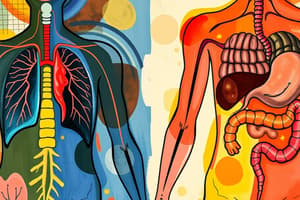Podcast
Questions and Answers
What is the primary function of the respiratory system?
What is the primary function of the respiratory system?
- Breaking down food for energy
- Removing carbon dioxide from the body
- Supplying nutrients to cells
- Absorbing oxygen from the environment (correct)
Which organ is responsible for distributing oxygen to the alveoli in the lungs?
Which organ is responsible for distributing oxygen to the alveoli in the lungs?
- Trachea
- Liver
- Bronchi (correct)
- Esophagus
Why is the circulatory system essential for our health?
Why is the circulatory system essential for our health?
- It supplies oxygen to body cells and removes waste products (correct)
- It maintains body temperature and hydration levels
- It breaks down food and absorbs nutrients
- It transports air to the lungs for respiration
How does the respiratory system contribute to maintaining optimal health?
How does the respiratory system contribute to maintaining optimal health?
What role does the alimentary canal play in the human body?
What role does the alimentary canal play in the human body?
What is the function of the circulatory system?
What is the function of the circulatory system?
Where does nutrient absorption primarily occur in the digestive system?
Where does nutrient absorption primarily occur in the digestive system?
What is the role of enzymes in the digestive process?
What is the role of enzymes in the digestive process?
Which of the following is NOT a hygienic practice for maintaining optimal health?
Which of the following is NOT a hygienic practice for maintaining optimal health?
How does exercise contribute to maintaining optimal health according to the text?
How does exercise contribute to maintaining optimal health according to the text?
Flashcards are hidden until you start studying
Study Notes
Systems: Understanding Our Body's Complex Network
The human body is a remarkable, interconnected organism that relies on various systems to maintain life and health. Let's explore four key systems—the respiratory, digestive, circulatory, and health and hygiene—to gain a deeper understanding of how they work together to keep us functioning optimally.
Respiratory System
The respiratory system is responsible for supplying oxygen to our body's cells and removing waste products like carbon dioxide. It achieves this through an intricate network of organs and structures. Oxygen reaches the body through inhalation, usually when we breathe in via our nose or mouth. This air travels down the trachea, a tube that branches into two bronchi, one for each lung. Inside the lungs, smaller airways called bronchioles further distribute oxygen to tiny sacs called alveoli. Here, the exchange of oxygen and carbon dioxide occurs across the thin walls of the alveoli and the surrounding capillaries. Through this process, essential nutrients are delivered to our cells, and waste products are removed.
Digestive System
The digestive system's primary role is to break down food and absorb nutrients, providing our body with the energy and raw materials it needs to function. The system consists of a long, winding tube called the alimentary canal. Starting with our mouth, food enters the esophagus, which transports it to the stomach. In the stomach, food is mixed with stomach acid and enzymes to begin the digestion process. Once broken down, food moves to the small intestine, where nutrients are absorbed into the bloodstream. The remaining waste products, now called feces, move into the large intestine (colon) before being expelled from the body.
Circulatory System
The circulatory system is responsible for transporting nutrients, oxygen, and waste products throughout the body. It consists of the heart, a muscular organ that pumps blood, and a network of blood vessels. Blood vessels include arteries, which carry oxygen-rich blood away from the heart to the body's tissues, and veins, which bring oxygen-poor blood back to the heart to be reoxygenated.
The heart is divided into four chambers: two atria and two ventricles. The two atria receive blood from the body and lungs, while the two ventricles pump blood out to the body and lungs. Blood flow is regulated by the heart's four valves, ensuring that blood flows in a single, forward direction. The heart's contractions generate rhythmic pulses that can be felt in our wrists and necks.
Health and Hygiene
Health and hygiene are essential components of maintaining a functional human body. Good hygiene practices reduce the risk of infections and illnesses, protecting our bodies' complex systems. Hygienic practices include handwashing, using proper sanitation facilities, and maintaining a clean living environment.
Additionally, regular exercise, a balanced diet, and adequate sleep are crucial for supporting the body's systems and promoting optimal health. Exercise strengthens the heart and lungs, while a balanced diet ensures that the body receives the nutrients it needs to function efficiently. Adequate sleep allows the body to rest and rejuvenate, supporting the optimal functioning of all systems.
In summary, the human body is an intricate network of systems that work together to support life and health. Understanding these systems and their roles, as well as practicing good hygiene, is essential for maintaining optimal health. By learning about our respiratory, digestive, circulatory, and health and hygiene systems, we can develop a deeper appreciation for our bodies and the complex processes that keep us functioning optimally.
Studying That Suits You
Use AI to generate personalized quizzes and flashcards to suit your learning preferences.




